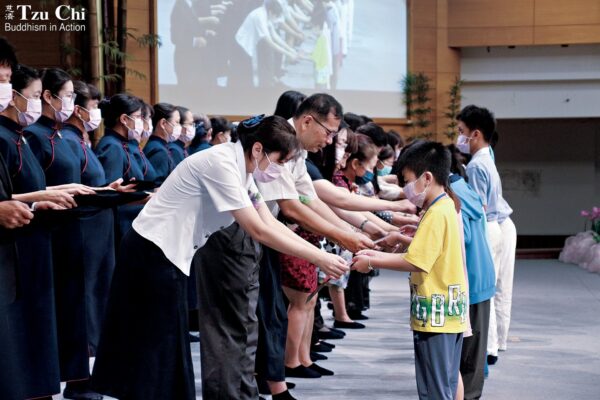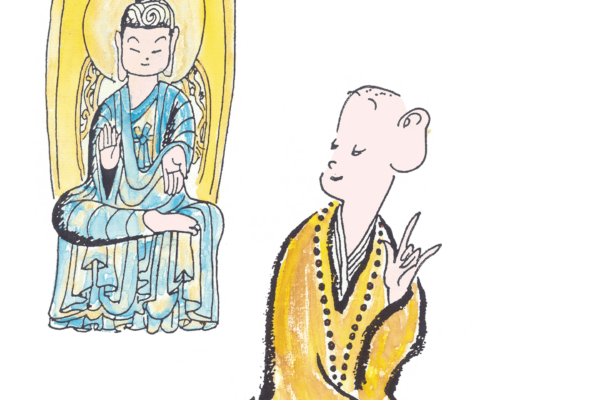By Hong Jing-jing
Translated by Syharn Shen
Photos by Hsiao Yiu-hwa
The palliative care team at Taichung Tzu Chi Hospital bears witness to all kinds of stories as they bring comfort and support to terminally ill patients on their end-of-life journey.
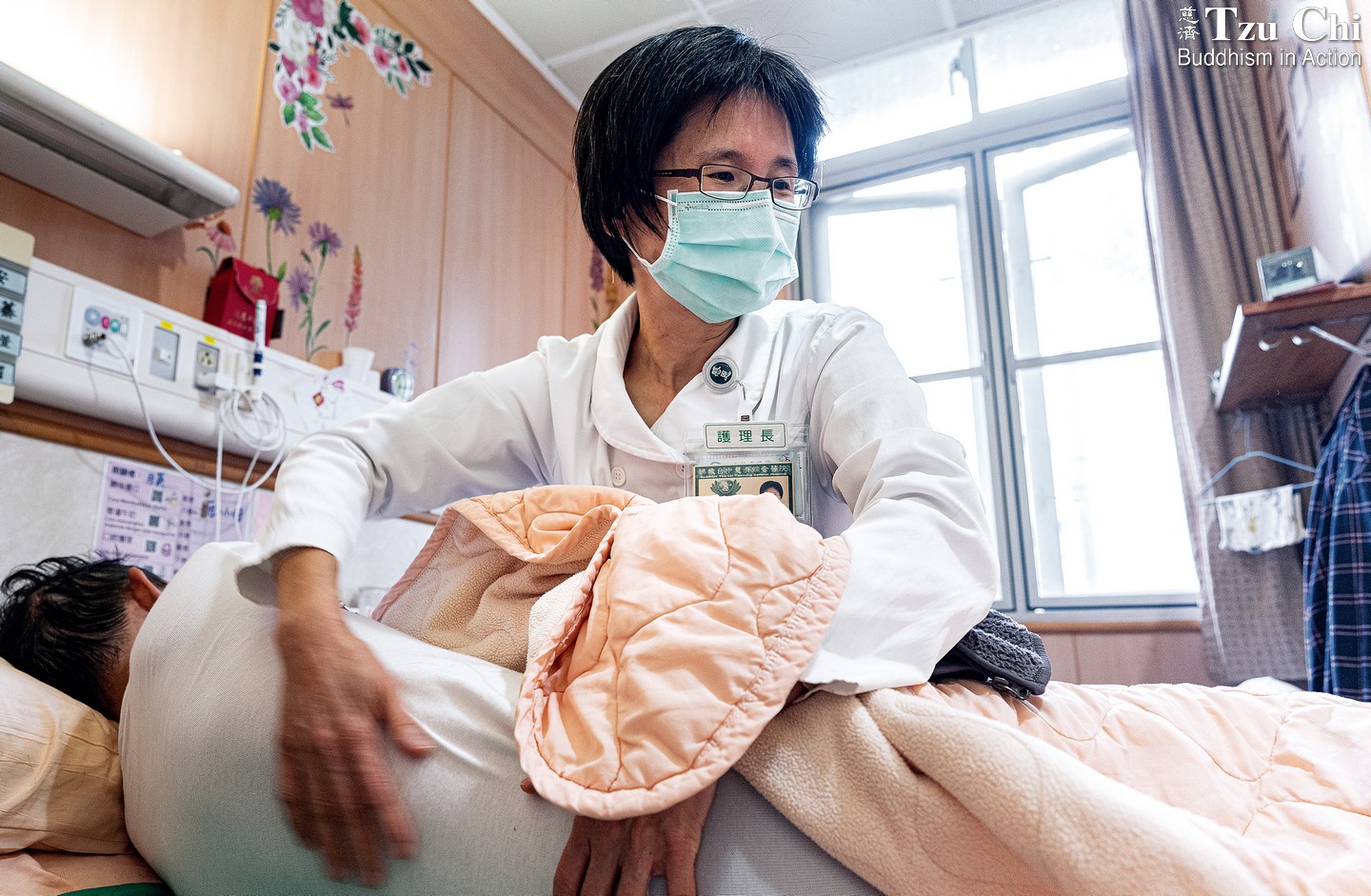
End-of-life care encompasses the support of the body, mind, and spirit. The first and crucial step is to bring physical comfort to the patient, relieve their pain, and improve their quality of life.
Happy events are taking place in the palliative care ward at Taichung Tzu Chi Hospital, central Taiwan. Instead of medications or syringes, head nurse Huang Mei-ling (黃美玲) is holding a cup of sweet tea and a red envelope for a bride-to-be. Family, nurses, and hospital volunteers have gathered to celebrate together with the fiancée’s father, who has terminal cancer, as he watches with contentment as his only daughter becomes engaged.
In another room, a lively party is being held for a grandmother by her children and grandchildren, who have all agreed to dress in pink to celebrate Mother’s Day with her.
Despite the different stories that unfold behind the doors lining the corridor of the palliative care ward, the medical team and volunteers there strive to fulfill the wishes of terminal patients and help them and their families find peace. As head nurse Huang commented, “End-of-life care can be full of warmth!”
Comfort comes first
Established in 2012, the palliative care ward at Taichung Tzu Chi Hospital, named “the Heart Lotus Ward,” offers end-of-life care to terminally ill patients as they navigate their final journey in life.
“Many patients and their families feel uneasy or apprehensive about a palliative care ward because they associate it with end-of-life preparations and funeral arrangements,” Huang said. To help patients and their families overcome their fear of death, her team strives to gain their trust within 24 hours of admission.
Caring for terminal patients requires attention to their physical, emotional, and spiritual needs. The first and foremost step is to ensure physical comfort, which helps the medical team establish a positive relationship with patients and their families. Relieving symptoms such as nausea, vomiting, pain, and shortness of breath, as well as assisting with comfortable positioning and aromatherapy, can help the patient become more comfortable. Bathing is an important activity for patients and taking a bath that feels like soaking in a hot spring can often promote restful sleep. Nurses can further provide reassurance to family members by saying, “Please rest well at night. I’ll take good care of your loved one, so please don’t worry.”
Grandpa Jin was a patient at the Heart Lotus Ward. He was an outstanding teacher of traditional Chinese painting, but suffered from cancer in his later years. When he was admitted to the palliative care ward, the doctors immediately adjusted his pain medications to ease his discomfort. The next day, the nurses helped him take a bath in a massage tub. They also invited his wife and daughter to help out. During the process, Grandpa Jin was very relaxed, and the bathroom was filled with laughter.
Grandpa Jin radiated a newfound vitality after the bath, feeling fully refreshed. He joyfully told his wife, “There’s no need to go to heaven; this is already a paradise on Earth. Go home and bring my paintings.” The next day, she brought three peony paintings by her husband to the ward, one of which was hung on the ward’s corridor wall. Everyone smiled and said, “The bath was so worth it.”
After Grandpa Jin peacefully passed away in the ward, his daughter recalled his time there with tears in her eyes: “We’re happy we let Dad come to the Heart Lotus Ward. We were able to spend such precious time with him during his final days.”
Nurse Huang explained that the purpose of inviting family members to help bathe a patient is to give them a sense of involvement, enjoy time with their loved one, and see the patient being treated with respect. Even more profound is that when the family members go through the grieving process in the future, they will have beautiful memories of the patient being happy and relaxed, instead of only remembering the painful and sad moments.
“Thanks to Grandpa Jin, our team was reminded of our original aspirations when we first decided to work in palliative care: to lovingly care for each suffering patient and bring them comfort and relief,” expressed Huang.
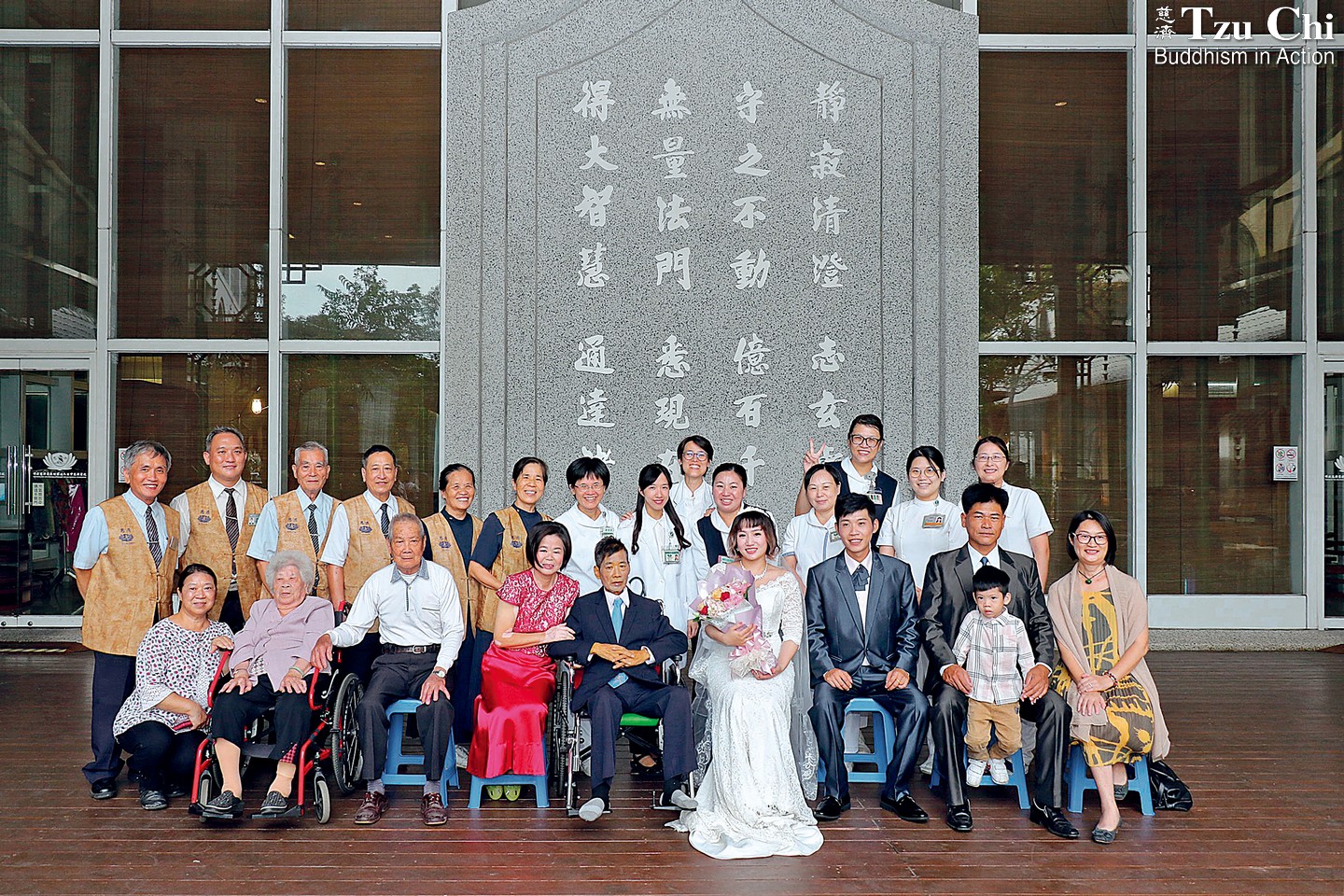
A heartwarming event takes place at the Heart Lotus Ward in Taichung Tzu Chi Hospital as a terminally ill father is able to attend his only daughter’s engagement ceremony.
Jiang Bo-Wei
Heart-to-heart connection
One day, Tzu Chi volunteer Huang Hui-li (黃惠莉) came to head nurse Huang and asked, “Can we hold a living funeral for Sister Li-zhu?”
Volunteer Lin Li-zhu (林麗珠) was suffering from terminal lung cancer. She had undergone several rounds of chemotherapy and targeted therapy, but sadly these treatments hadn’t been able to stop her cancer cells from spreading and weakening her condition. She ultimately decided to receive end-of-life care at the Heart Lotus Ward. Her legs were severely swollen when she was admitted. Fortunately, attending physician Dr. Suhng Lii-an (宋禮安) was able to help reduce the swelling using laser acupuncture.
Lin’s fellow volunteers had so much they wanted to say to her before it was too late. They wished to express their gratitude and love for her and to bid her a fond farewell. Considering Lin’s condition, the palliative care team knew they had to act quickly. Two days later, the living funeral was successfully held. Due to COVID-19 restrictions, it was conducted via videoconferencing and connected three locations. In the Heart Lotus Ward, Lin was surrounded by her family and fellow volunteers. They held her hands and shed tears. An additional 80 recycling volunteers attended the event virtually. Dharma Master De Mai (德勱) offered her blessings via videoconferencing from the Jing Si Abode, the Buddhist convent founded by Dharma Master Cheng Yen. “Words cannot express my gratitude,” said Lin feebly as she lay in bed.
Lin left the hospital and returned to her home the day after the funeral. Two days later, the team at the Heart Lotus Ward received a message from her family: “Dear Nurse Huang, my mother passed away peacefully this morning. We’d like to thank the team for caring for her and our family with loving warmth. We’ll fondly remember the sunny herbal garden, the fresh flowers by her bed, the soothing and relaxing baths, the kindness you showed to my mother, your looks and words of comfort, as well as your gentle guidance towards a peaceful end of life…. My mother returned home very happy. We thank the nurses for tirelessly answering all of our questions and for supporting us through our worries. We are filled with gratitude….”
Lessons in life and death
As flowers bloom and wither, as one season leads to another, the passage of time reminds us to reflect on the meaning of life and death. How do we welcome a newborn life, and how do we say goodbye to a life at its end?
Huang said that witnessing terminal patients struggle with fear towards death and the unknown is akin to her own experience of learning end-of-life care. She faced death for the first time in a hospital ward 30 years ago. She had just graduated from nursing school and was working in the pediatric cancer ward at National Taiwan University Hospital (NTUH), northern Taiwan. A three-year-old child she had been caring for had just passed away, surrounded by family and nurses praying by the bedside. Huang, feeling anxious and helpless, didn’t know how to comfort the family and was afraid of entering the ward. However, seeing more experienced nurses calmly continue their work, she was inspired to persist and learn the art of end-of-life care.
Huang was fortunate to find a mentor in Wang Yu (王浴), who is considered Taiwan’s most experienced head nurse in palliative care. She began learning from Wang while working at the pediatric cancer ward at NTUH and continued to do so after a palliative care ward was established at the hospital in 1995.
“Caring for patients as if they were our own family” was the most important lesson Huang learned from Wang, as she witnessed her mentor spend a lot of time listening, talking, and supporting patients and helping them fulfill their final wishes. Even after retirement, Wang trained and led volunteers to offer end-of-life care in communities. Huang was deeply inspired by Wang’s selfless love and lifelong dedication to palliative care and is determined to follow her example.
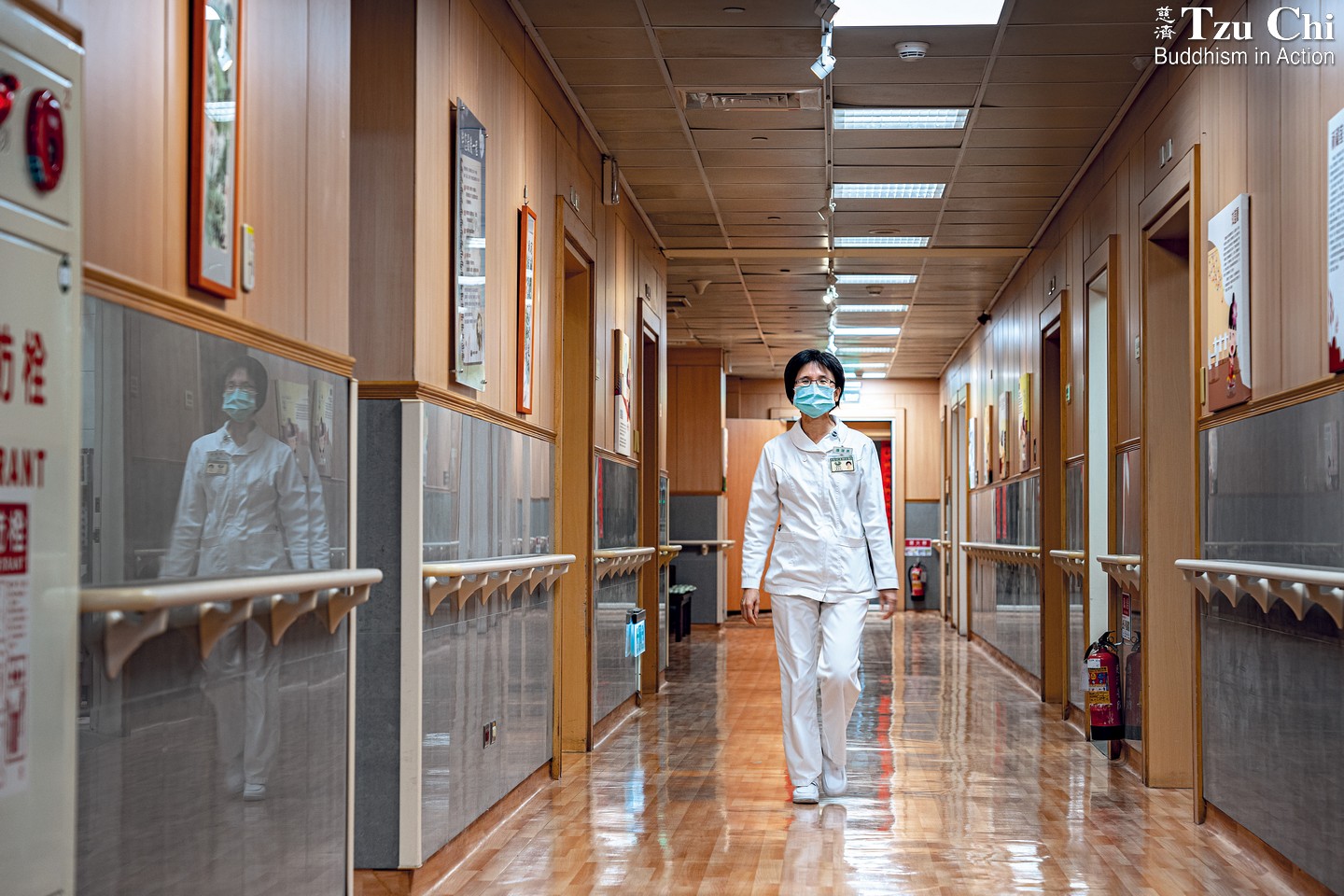
Head nurse Huang Mei-ling pictured at the Heart Lotus Ward at Taichung Tzu Chi Hospital. She and her team work together to help terminally ill patients find peace and solace as they approach death.
Despite pain, life is still good
Management of a patient’s physical symptoms is required for patients to have a peaceful passing, but psychological and spiritual care is just as essential. “It’s very important to help patients find peace of mind,” said Huang.
Mr. Chen lived alone and assembled racing bicycles for a living. He fought hard against oral cancer, believing he could overcome it. However, his condition continued to deteriorate until he could no longer undergo curative treatment. In 2018, he was admitted to the palliative care ward at Taichung Tzu Chi Hospital. For the first three or four days, he was clearly afraid of death, hiding under his sheets and unable to sleep, even contemplating thoughts of trying chemotherapy again.
An attending physician first controlled his symptoms, and a professional team of volunteers took turns offering him support. They brought bicycle models and engaged him in conversations about his favorite models. They also encouraged him to make art by drawing the image of the Goddess of Mercy. Mr. Chen gradually began to find solace at the Heart Lotus Ward. Despite being accustomed to feeling lonely due to his long-standing solitary lifestyle, the kind of care and support he received there reminded him of being with a caring family.
With his pain successfully managed, he began to take walks in the garden and invited friends to visit him in the ward. He drew a picture of the Goddess of Mercy and gave it to a good friend who had accompanied him to and from the hospital during his previous cancer treatments. Volunteers accompanied Chen as he looked back on his life, helping him to affirm his value and find meaning in his life.
Life can still be good, even amid illness or pain; it’s only a matter of exploring new ways to enjoy it every day. The love and care he received at the ward helped Mr. Chen view his situation in a new light and gradually come to terms with his irreversible physical condition. When he could no longer speak, he wrote the following words: “Live in the moment and do not fear death.” When asked where he’d like to spend his final days, he wrote, “In the Heart Lotus Ward.”
As Chen wished, he stayed at the palliative care ward, receiving gentle and loving care, until his last day. Having entrusted his house and belongings to his good friend, he bid farewell to the world without regrets.
Grief support begins early
Palliative care targets not only the patient but also the family members during the end-of-life journey. Huang explained that attending to their loved one’s emotional needs and dealing with their own grief can be physically and emotionally overwhelming for families. “We talk to family members,” said Huang, “and ask them if they understand the patient’s condition, how they perceive it, and whether the patient gave them any instructions when their physical condition was better.”
Huang teaches other nurses how to support family members as they express their stress in caring for the patient and the pain of anticipating their loss. As they talk about their challenges, they may become overwhelmed with emotions. “When that happens, we remind them that they have the support of many people, that nurses and the volunteer team are there to listen and give help. We let them know they are not alone on their difficult journey.” Huang added that as most families today are nuclear with fewer members, their support systems are often weak. The palliative care team therefore reminds family members that they can also seek support from relatives, friends, counseling services, and other sources. Even after their loved one has passed way, family members are welcome to return to the Heart Lotus Ward for further support and conversation.
Su Shu-fen (蘇淑芬) was the wife of a former patient at the Heart Lotus Ward. Her husband suffered from excruciating pain due to head and neck cancer and was admitted to the palliative care ward. The medical staff successfully controlled his pain, while nurses provided round-the-clock care and volunteers offered their warm support. The husband was initially stubborn and ill-tempered, but he was so deeply moved by the care he received he eventually let down his guard and cooperated with the medical staff. He passed away peacefully in the end, amidst the chanting prayers of a group of volunteers. “My husband passed away without any regrets, so I can completely let go,” said Su. “This gives me strength to keep going. If he hadn’t passed away in peace, every day in the future would be very painful.”
Since her husband’s passing over a decade ago, Su has made it a tradition to send a card to the palliative care ward every Christmas and to bring her two children to visit during summer vacation, catching up with everyone. The Heart Lotus Ward has become a second home to her. She has even become a Tzu Chi volunteer, passing on love and care to others in need. Her return visits to the ward always bring immense encouragement to Huang and her team. Providing palliative care to terminal patients is a tough job, and the turnover among nurses is high. Su’s cards and visits over the years have served as a source of motivation and encouragement for the team to keep moving forward. “I’m deeply thankful to Shu-fen,” said Huang.

Expressing gratitude, making apologies, saying “I love you,” and bidding farewell need not be reserved for end-of-life moments. To avoid regrets, family members can reflect on their loved one’s life with him or her while the patient is conscious and take the opportunity to express what they want to say to them.
Zhuo Guan-ling
Self-care before caring for others
A palliative care ward requires a comprehensive approach to care that covers symptom control, ensuring patient comfort, and preparation for a peaceful passing. Huang noted that while nursing courses may offer some training for providing psychological or spiritual support, it is often insufficient. Moreover, long-term exposure to an environment of sadness among patients and their families causes tremendous stress on a nurse’s physical and mental health. “We need to have the ability to restore and renew ourselves, or else we’ll easily burn out,” she said.
Wu Wei-ting (吳瑋婷), a nurse at the Heart Lotus Ward, recalled feeling heartbroken three years ago when she saw a patient with terminal cancer curled up in bed due to pain. Through aromatherapy massage, she finally managed to help relax the patient’s furrowed brow. The smile on the patient’s face became her inspiration to continue serving in palliative care.
Huang has been working in end-of-life care for 26 years. She feels grateful to be a nurse and to help alleviate the suffering of patients she meets. She has learned a lot over the years and has become more at peace in body, mind, and spirit. She has come to realize that death is not the ultimate end of life, but actually marks the beginning of another life. She helps patients be present in their bodies and minds during their transitional stage, and to face death without fear. Meanwhile, the support of a professional team for family members during the difficult process can help them transform their grief and suffering into love and strength.
“In the Heart Lotus Ward, a cycle of love is created. It’s like trying to find hidden diamonds and treasures in a desert full of sand and rocks. If you can discover these diamonds and treasures buried within, your spirits will be elevated. We are involved in this process, constantly learning and growing, and we will continue moving forward,” expressed Huang.

